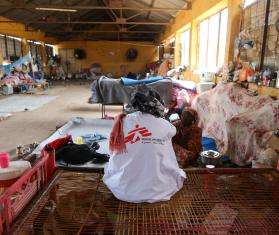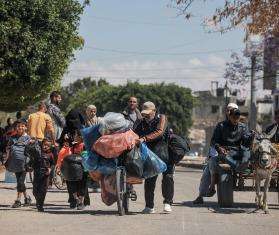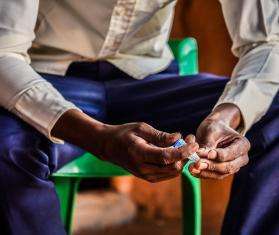NEW YORK/GENEVA, MAY 29, 2020—Doctors Without Borders/Médecins Sans Frontières (MSF) welcomed today's launch of the World Health Organization (WHO) Solidarity Call to Action for equitable global access to COVID-19 health technologies through sharing of knowledge, intellectual property, and data. Sharing this type of information will allow more manufacturers to quickly produce medical tools to fight COVID-19 and make sure more people have access to them.
Multiple heads of state have referred to products to fight COVID-19 as "global public goods." Governments must now make commitments to follow through on making sure this becomes a reality. As an international medical humanitarian organization responding to the COVID-19 pandemic in more than 70 countries, MSF is calling on governments to stand with patients and frontline workers to adopt enforceable measures that bind parties to any agreement to ensure access to COVID-19 products for everyone.
"Safe and effective vaccines, treatments, and tests must be developed free from exclusive rights, produced in adequate quantities, distributed fairly, and made available to all people—especially the most vulnerable—in all countries and free of charge at the point of care," said Dr. Christos Christou, MSF's international president. "While the WHO Solidarity Call is an important step, it will require effective implementation and enforceable measures to guarantee access to both existing and future COVID-19 technologies for everyone. Now is not the time to allow business-as-usual approaches from pharmaceutical corporations and near-sighted nationalism from governments to stand in the way of global cooperation on medical tools to respond to this pandemic. COVID-19 will not be over until it is over for everyone."
Global shortages of personal protective equipment (PPE) and a lack of testing capacity and effective treatments to respond to COVID-19 have placed enormous strain on countries and treatment providers worldwide. This must not be allowed to happen with new vaccines, treatments, and tests once they hit the market. Failing to ensure broad access to these types of products will prolong the pandemic for everyone.
An effective global response to COVID-19 will depend on there not being any private monopolies for any treatments, tests, or vaccines for the disease. Pharmaceutical corporations control technology, data, and knowledge through intellectual property and confidential agreements. They often allow only a small number of other companies to produce and supply products they market, remaining in control of where these are sold and at what price. Gilead Sciences has just deployed this approach, by excluding half of the world's people in a licensing deal for the COVID-19 drug remdesivir. This is not acceptable and could be prevented by allowing generic manufacturers to more easily make and sell the same medicine at a more affordable price, which would help drive down the cost of the medicine in general.
"As MSF, we are struggling to treat people affected with COVID-19 in countries where health systems are already in an incredibly weak state and supply of PPE and oxygen is extremely low," Christou said. "Over the years, we have witnessed too many painful examples of inequitable access to lifesaving treatments—from HIV and drug-resistant tuberculosis to hepatitis C and Ebola—where a proprietary approach to medicines has stood between our medical teams and patients, restricting the care we can provide."
There should also be full transparency around all funding for COVID-19 medical tools, and governments should make use of all possible legal and policy measures to remove barriers caused by private monopolies to ensure access to COVID-19 technologies for everyone. For example, people should know how much taxpayer money is going into each product. Additionally, if pharmaceutical corporations decide to charge high prices for their medicines, government should take steps to make it easier to override patents by issuing compulsory licenses. Compulsory licenses are a legal tool that countries can use to allow lower-cost versions of desperately-needed medicines to be supplied while those medicines are still under patent.
MSF is also stressing the importance that any international mechanism to allocate medical tools takes into account the need for humanitarian organizations to operate and continue to provide assistance to people in crisis. As MSF struggles to focus on continuity of services in areas already facing massive health needs, it is important that effective measures be put in place to mitigate any adverse impact of COVID-19 on accessing other essential health tools and services.
MSF teams are racing to respond to the COVID-19 pandemic in over 70 countries, either by adapting existing activities to the COVID-19 pandemic, or by opening projects in new countries as they become pandemic hotspots. MSF's response focuses on three main priorities: supporting health authorities to provide care for COVID-19 patients, protecting people who are vulnerable and at risk, and keeping essential medical services running.




